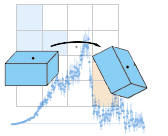
| HOME | PEOPLE | RESEARCH | ACADEMICS | TRAVEL/VISITORS | LINKS | CONTACT |

|
Web Mail
Mailing Lists
Computing Resources
Site Map
Computational Developmental Learning
Dr. Michael Coen
Computer Science and Artificial Intelligence Laboratory
MIT
4:00 PM to 5:00 PM
Jorgensen 74 (basement)
Animals routinely solve extremely difficult learning problems during development. How do they do this? Can we formalize their learning in a computational model? What insights would this model provide about learning in both biological and computational systems?
This talk presents a new mathematical framework for understanding learning based on unsupervised interactions with the world. My approach draws upon evidence gathered by the brain and cognitive sciences demonstrating the extraordinary degree of interaction between sensory modalities during the course of ordinary perception.
I provide evidence these interactions are fundamental to solving some of the difficult developmental learning problems faced by both animals and artificial systems. This work demonstrates that a biologically inspired approach can help answer what are historically challenging computational problems. These include, for example, how to cluster nonparametric data corresponding to an unknown number of categories and how to learn motor control through observation.
To illustrate this framework, I present: (1) a system that learns the number and structure of vowels in American English by simultaneously watching and listening to someone speak. It has no advance linguistic knowledge and receives no information outside of its sensory channels; and (2) a system that learns to sing like a zebra finch looking for a mate, following the developmental stages of a juvenile zebra finch, thereby demonstrating self-supervised sensorimotor learning.
I also present recent results applying this framework to the unsupervised segmentation of functional MRI data to automatically learn modular functional structure in the human brain. (Joint with N. Kanwisher and L. Reddy, MIT and C. Baker, NIH.) This demonstrates that a biologically inspired theory of machine learning can symbiotically help us understand the very systems providing its inspiration.
Bio: Michael Coen is a postdoctoral associate at the Computer Science and Artificial Intelligence Laboratory at MIT, where he received his S.B., S.M., and Ph.D. degrees. His primary academic interests are developing biologically inspired approaches to machine learning and reciprocally, to using these approaches to better understand learning in biological systems. His doctoral work on self-supervised machine learning received MIT's Sprowls Dissertation Award.
|
©2003-2011 California Institute of Technology. All Rights Reserved webmaster |
|